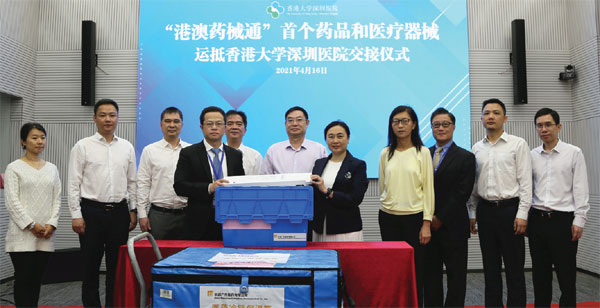HK-Shenzhen pulls off a first under medical connect
Innovative measures
In December 2020, the National Medical Products Administration set up a Greater Bay Area drug evaluation and inspection center in Shenzhen's Futian district, dedicating itself to integrating the Greater Bay Area's medical sector.
"One benefit of founding such an organization is that the review and clinical application data included in the center this time will directly go into the national database, substantially speeding up the national approval process," said Huo.
"Another innovative measure we initiated is a special drug and device traceability system, she added. Compared to nationally approved products, which have official government codes, those under the connect need a new code system that can trace each process of transportation, customs information and origin.
After the successful application of the first drug and medical device, Huo said the medical connect will be expanded to more hospitals and cover further products.
China Resources has begun preparing the second batch of drugs and devices through the program, focusing on treating major and rare diseases, such as cancer.
In communicating with medical product suppliers, Huo said she found them to be "very positive" about the program. "Their teams on the mainland, in Hong Kong and their headquarters have actively cooperated with us."
"As the largest medical product importer in South China, we have many hospital partners and many of them have shown great interest in the scheme," she added.
Huo suggested the next step be to optimize the filing process, reduce filing time and track the effects of delivered products.
She estimated the company's total import volume could exceed 8 billion yuan ($1.24 billion) this year and continue to rise.

Management teams from the University of Hong Kong-Shenzhen Hospital and China Resources Guangdong Pharmaceutical pose for a group photo with the first imported medicine and medical device under the connect on April 16. [Photo provided to China Daily]
Many hospitals across the mainland have been keeping an eye on new medicine and equipment imported through the connect. The Hebei boy with scoliosis was referred to HKU-SZH by a well-known spine surgeon from the Department of Orthopedics at Peking Union Medical College Hospital. The surgeon had traveled from Beijing to Shenzhen to witness the surgery, showing great interest in bringing the method to his hospital.
In March, construction started on a healthcare center in Shenzhen's Pingshan distrcit, attended by medical personnel and doctors from more than 50 Hong Kong clinics. In the same month, Guangzhou's Clifford Hospital opened a new facility employing more than a dozen Hong Kong doctors. Both institutions have applied to become the next pilot of the connect. As the connect program involves more hospitals and drugs, the demand for Hong Kong medical professionals will rise as new drugs and devices have to be supervised or performed by experienced personnel.
Citing Cheung's titanium rod surgery as an example, the Hong Kong surgeon said those who intend to perform similar operations in future will need at least five years' experience in treating scoliosis or have performed more than 20 scoliosis surgeries.
Barriers remain for experienced Hong Kong doctors to practice on the mainland. According to mainland regulations, only chief physicians are allowed to perform level-four surgeries. Moreover, local qualification recognition is also tied to applications for scientific research funding.
To solve the problem, the Shenzhen government last month issued a document to promote the flow of cross-border medical services and resources. One of the key measures is to simplify qualification evaluation for Hong Kong and Macao medical personnel.
HKU-SZH is also a pilot hospital for implementing related measures in the document, including supporting top-end hospitals in reviewing professional titles itself. So far, more than 30 Hong Kong consultants have been recognized as chief physicians by the hospital, according to local media reports.



 Print
Print Mail
Mail

